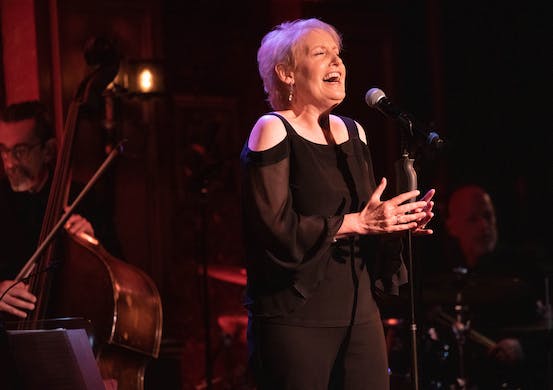For the Callaways, Sisterhood Is Only a Starting Point
They encompass both theater music and jazz, not alternating between the two but doing both at once. That’s merely the first of many dualities that drive the evening forward.

Liz Callaway and Ann Hampton Callaway
‘As Long As We’re Together’
At 54 Below through November 26
‘To Steve With Love: Liz Callaway Celebrates Sondheim’
(Working Girl Records)
Billed as “Liz Callaway and Ann Hampton Callaway” rather than “the Callaway Sisters,” what makes them a cohesive “act” rather than two sisters who happen to be singing together by carefully aligning both their similarities and their differences. Daughters of a music teacher, they grew up in Chicago. Ann became a pianist and songwriter while immersing herself in the world of jazz, and younger sister Liz slouching toward musical theater; one wanted to be Ella Fitzgerald, the other Barbara Cook.
Yet the unexpected outcome was that Ann is the one who claimed the more outsized theatrical personality while Liz developed a remarkable musicianship that Broadway singers are rarely given credit for.
On their own, either is an essential act; together, they are something even more. It’s not that they “complete each other,” as that expression goes, but rather their act has more places to go with the two of them playing off each other.
As a duo, they encompass both theater music and jazz, not alternating between the two but doing both at once. That’s merely the first of many dualities that drive the evening forward. They open with “Together Wherever We Go” from “Gypsy,” which takes a detour through pop-jazz trumpeter Chuck Mangione’s “As Long As We’re Together.” Rather than doing them in either straight ahead 4/4 swing time or like “a show tune in 2/4” (in Jerry Herman’s phrase), they explore a third option by treating them like a Brazilian samba.
The contrasts continue: between solo showcases for each of the sisters and thoughtfully arranged duos; between numbers that modulate continually versus those that manage to stay in the same key for a little while; and between elaborate medleys and less complicated standalone songs. They also shift gears in terms of general tone, between the sentimental and the sarcastic — and sometimes even mock-bitchy, as when they upend Cole Porter’s “Friendship” in the general key of catfight. In a construct like Harold Arlen and Ted Koehler’s two iconic “climate” songs, “Stormy Weather” and “When the Sun Comes Out,” you feel like you’re getting everything you could possibly want, both maximum musicianship and maximum expression and drama.
The high-energy duets and medleys also serve to make the more intimate solo features seem, by contrast, even more moving. Ann delivers her feature, Joni Mitchell’s “Both Sides Now,” as directly and personally as possible, replacing musical director Alex Rybeck at the piano and accompanied only by a very lightly bowed bass from Ritt Henn and minimal brushes from drummer Ron Tierno.
Liz’s solo consists of two songs — “I Remember” and “Take Me to the World” — that are also heard on her new album. “To Steve With Love: Liz Callaway Celebrates Sondheim” summarizes her 40-year-relationship with the composer and Broadway icon, as friend, mentor, and professional collaborator. She was one of the few singers he regularly selected to sing his songs at concerts and on other occasions.
Both songs are from Stephen Sondheim’s 1967 television musical, “Evening Primrose,” an odd duck of a production that is essentially a “Twilight Zone” episode set to music. The album was recorded live in the same 54 Below in June and also “launched” here two weeks ago. The timing is impeccable: Ms. Callaway is perhaps the first singer to show how amazingly relevant those two songs are for this immediate post-pandemic era, if that’s what it is, recalling those many moments in the last three years when we had to struggle even to remember what day it was.
Liz comes out of the solo spot to duet with Ann on the very moving “Our Time,” introduced in her Broadway debut, “Merrily We Roll Along.” None of us is young anymore, but Liz and Ann are certainly not old, and “Our Time” crystallizes a very specific moment of both reflecting back and looking forward.
Moving beyond Broadway, they revisit high-end 1970s pop with duets on Carly Simon’s “That’s the Way I’ve Always Heard It Should Be” and a masterpiece of a nine-minute Stevie Wonder medley. Here, they’re so musical and sure-footed that it doesn’t bother you that most of the lyrics on “Sir Duke” are mostly “doot-doot-doot,” or that “Living for the City” only works if you pronounce the last word as “cit-tay.”
The Callaways close with John Bucchino’s “Grateful” and then encore with Frank Loesser’s “Brotherhood of Man,” the latter done in full-on Broadway gospel style, complete with a break into hand-clapping doubletime.
All of which underscores what makes Liz Callaway and Ann Hampton Callaway, both individually and as a team, so special: They’re the only sibling act that could do equal justice to two iconic Steves, Stephen Sondheim and Stevie Wonder.

